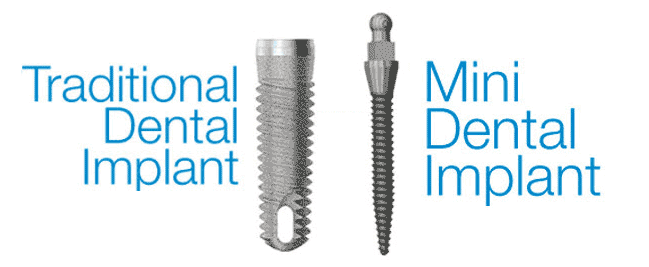
When dental implants first appeared in the 1960s, many dental patients with broken or missing teeth thought that things could not get better. Prosthodontists refined techniques and materials over the next few decades, and a good thing got even better. Then, mini-implants came along. Today, mini-implants have an even higher patient satisfaction rate than full-size implants.
Mini-implants are a lot more than just good looking. They also feel natural. Perhaps most importantly, the cost of mini-implants is much lower than the cost of full-size implants.
Who is a Candidate for Mini-Implants?
Above the gumline, mini-implants are the same as full-size implants. The crown (visible part of the tooth) is just as big, and the abutment (part of the implant that secures the crown) is just as strong.
The artificial tooth root’s material is just as strong as well. But instead of a full-size titanium post, Dr. Stone uses a smaller and thinner titanium thread.If your mouth can accommodate min-implants, there are a number of advantages, including:
- Less Invasive: Typically, mini-implants do not require a surgical procedure. The expedited process means a lower cost. Additionally, there may be less need for anesthesia.
- No Bone Grafting: Many patients do not have enough bone mass in their jaws to support thick titanium posts, so Dr. Stone must harvest bone cells from other parts of the body. Mini-implants never require bone grafting.
During your consultation, Dr. Stone will thoroughly go over all the pros and cons of mini-implants. They are not for everybody, but they could be for you.
The Cost of Mini-Implants
Whereas full-size implants usually cost about $4,000, mini-implants usually cost between $500 and $1,500 per tooth. The materials used in the crown may be the most important cost variable. For back teeth, Dr. Stone often uses advanced resin mixed with metal. More visible front teeth usually require resin only. Other variables include the prosthodontist’s level of experience and practice location.
Mini-implants are less expensive below the gum as well. Titanium threads are less expensive to produce than titanium posts. Furthermore, as mentioned above, mini-implants are a non-surgical alternative.
Note that the lower cost has nothing to do with the quality or longevity of the implant. Both full-size and mini-implants are made from top quality materials. Furthermore, since they are impervious to tooth decay and damage, they are easy to maintain and generally last a lifetime.
Mini-implants are the latest option for people with broken or missing teeth. They offer a cost effective and permanent solution to this troublesome problem. To get a glimpse of a mini-implant’s transformative power, reach out to Dr. John Stone at Best Dental Associates in Ft. Lauderdale.


